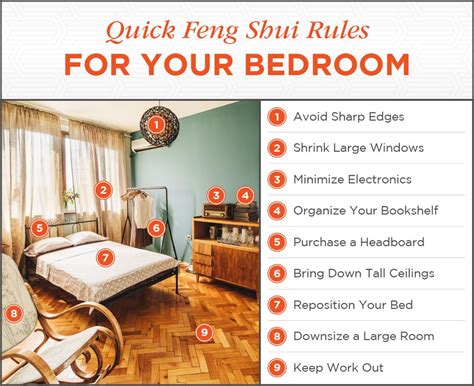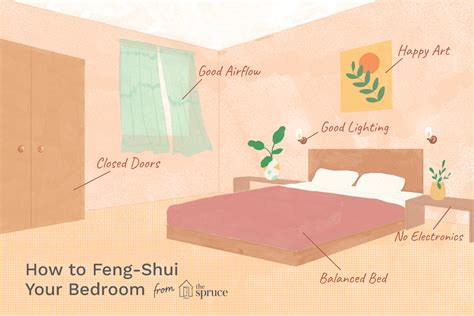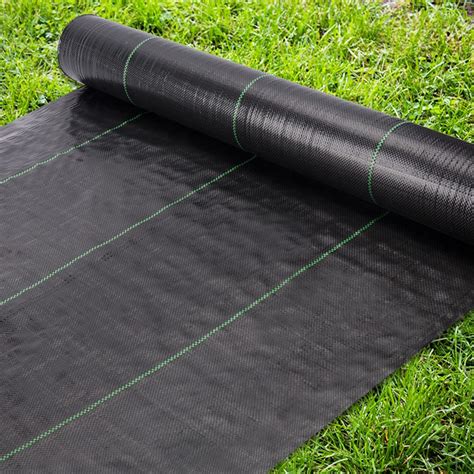
Decluttering your bedroom according to Feng Shui principles can significantly improve your well-being by fostering better sleep, reducing stress, and enhancing relationships; experts recommend removing televisions, desks, exercise equipment, and overly personal photos to create a more balanced and harmonious environment.
The bedroom, traditionally viewed as a sanctuary for rest and rejuvenation, can often become a repository for items that inadvertently disrupt its intended purpose. According to Feng Shui, the ancient Chinese practice of harmonizing individuals with their environment, certain objects can negatively impact the flow of energy, or “chi,” leading to sleep disturbances, heightened stress levels, and strained relationships. By strategically decluttering specific items, individuals can transform their bedrooms into tranquil havens conducive to relaxation and positive energy. Feng Shui experts advocate for the removal of four key categories of items: televisions, desks, exercise equipment, and overly personal photos. Each of these categories carries distinct energetic implications that can hinder the restorative qualities of the bedroom.
The Case Against Televisions in the Bedroom
Televisions, ubiquitous in modern households, are often considered a source of entertainment and relaxation. However, from a Feng Shui perspective, their presence in the bedroom can be detrimental to sleep quality and overall well-being. The screen’s emissive properties, projecting light and stimulating visual engagement, disrupt the body’s natural circadian rhythm, making it harder to fall asleep and achieve deep, restorative rest. Furthermore, the content displayed on television can introduce external stressors and anxieties into the bedroom environment, counteracting its intended purpose as a sanctuary from the outside world.
“The bedroom should be a sanctuary for rest and intimacy,” experts emphasize. “Televisions stimulate the mind and keep you from fully relaxing.” The electromagnetic frequencies (EMFs) emitted by electronic devices, including televisions, are also believed to interfere with the body’s natural energy fields, potentially contributing to sleep disturbances and other health issues. By removing the television from the bedroom, individuals can create a more conducive environment for relaxation, promoting better sleep and a greater sense of tranquility. This allows the bedroom to serve its primary function of rest and rejuvenation, free from the distractions and energetic disturbances associated with electronic devices. The absence of a television encourages more mindful and intentional engagement with the space, fostering a sense of peace and calm that is essential for restful sleep.
Desks and Work-Related Items: Separating Work from Rest
The integration of work-related items, such as desks, computers, and paperwork, into the bedroom environment blurs the boundaries between professional responsibilities and personal rest, creating a constant reminder of work-related stress and obligations. This encroachment of work into the bedroom can hinder relaxation and make it difficult to fully disengage from professional concerns, leading to increased anxiety and decreased sleep quality. Feng Shui principles emphasize the importance of creating distinct zones within a living space, each dedicated to a specific purpose. By separating the work area from the bedroom, individuals can establish a clear psychological boundary between professional life and personal rest, fostering a greater sense of balance and well-being.
“Keeping work items in the bedroom makes it difficult to switch off and relax,” experts advise. “The bedroom should be a space dedicated solely to rest and intimacy.” The presence of work-related items can also create a subconscious association between the bedroom and stress, making it harder to unwind and fall asleep. By removing these items, individuals can reinforce the bedroom’s identity as a sanctuary for relaxation, promoting a more peaceful and restful sleep environment. This separation allows the mind to fully disengage from work-related thoughts and anxieties, fostering a greater sense of calm and tranquility.
Exercise Equipment: Maintaining a Calm and Balanced Atmosphere
Exercise equipment, while promoting physical health and well-being, can disrupt the tranquil atmosphere of the bedroom and introduce an element of energetic imbalance. The association of exercise with exertion and physical activity can conflict with the bedroom’s intended purpose as a space for relaxation and rest. Furthermore, the presence of exercise equipment can serve as a constant reminder of fitness goals and potential shortcomings, contributing to feelings of pressure and anxiety. Feng Shui principles emphasize the importance of maintaining a calm and balanced atmosphere in the bedroom, free from distractions and energetic disturbances.
“Exercise equipment brings active energy into a space that should be calm and relaxing,” experts explain. “It’s better to keep these items in a designated workout area.” The presence of bulky exercise equipment can also contribute to a sense of clutter and spatial constraint, further disrupting the bedroom’s tranquil atmosphere. By relocating exercise equipment to a designated workout area, individuals can create a more harmonious and balanced environment in the bedroom, promoting relaxation and restful sleep. This separation allows the bedroom to serve its primary function of rest and rejuvenation, free from the energetic associations with physical exertion and fitness goals.
Overly Personal Photos: Balancing Relationships and Personal Space
While personal photos can evoke positive memories and foster a sense of connection, an excessive display of overly personal photos in the bedroom can create an imbalance in the energy flow, potentially hindering romantic relationships and personal growth. Feng Shui principles emphasize the importance of maintaining a balance between personal space and relationships, ensuring that the bedroom remains a sanctuary for both individuals within a partnership. An overabundance of photos depicting family members, friends, or past relationships can create a sense of crowding and emotional entanglement, disrupting the intimate atmosphere of the bedroom.
“Too many personal photos, especially of family or friends, can disrupt the energy between partners,” experts note. “It’s important to maintain a balance and create a space that feels intimate and personal for both people.” The presence of photos depicting past relationships can also create subconscious comparisons and emotional baggage, hindering the development of a healthy and fulfilling romantic connection. By curating the display of personal photos in the bedroom, individuals can create a more balanced and harmonious environment, promoting intimacy, connection, and personal growth. This curation allows the bedroom to serve as a sanctuary for both individuals within a partnership, fostering a sense of shared space and mutual respect.
Implementing Feng Shui Principles: Practical Steps
Implementing Feng Shui principles in the bedroom involves a conscious effort to declutter, reorganize, and create a space that promotes relaxation, harmony, and well-being. The first step is to identify and remove the four key categories of items: televisions, desks, exercise equipment, and overly personal photos. This may require some initial effort and adjustment, but the long-term benefits of a more tranquil and balanced bedroom environment are well worth the investment.
After removing these items, consider reorganizing the remaining furniture and décor to optimize the flow of energy within the space. Feng Shui principles suggest placing the bed in a commanding position, where the occupant can see the door without being directly in line with it. This position provides a sense of security and control, promoting restful sleep. It’s also important to ensure that the bedroom is well-ventilated and receives ample natural light, as these elements contribute to a sense of vitality and well-being.
Color choices can also play a significant role in creating a harmonious bedroom environment. Calming and soothing colors, such as blues, greens, and pastels, are often recommended for promoting relaxation and restful sleep. Avoid using overly bright or stimulating colors, such as reds and oranges, as these can disrupt the tranquil atmosphere of the bedroom.
Finally, consider incorporating natural elements into the bedroom décor, such as plants, crystals, or natural fibers. These elements can help to ground the energy of the space and create a greater sense of connection to nature. By implementing these practical steps, individuals can transform their bedrooms into havens of relaxation, promoting better sleep, reduced stress, and enhanced relationships.
Beyond the Four Items: Additional Feng Shui Tips for the Bedroom
While removing televisions, desks, exercise equipment, and overly personal photos is a crucial first step, several other Feng Shui principles can further enhance the energy of the bedroom. These include:
- Decluttering and Organizing: A cluttered bedroom can create a sense of chaos and overwhelm, hindering relaxation and disrupting sleep. Regularly decluttering and organizing the space can help to create a more tranquil and balanced environment.
- Maintaining Good Air Quality: Poor air quality can negatively impact sleep and overall well-being. Ensure that the bedroom is well-ventilated and consider using an air purifier to remove pollutants and allergens.
- Using Natural Bedding Materials: Natural bedding materials, such as cotton, linen, and silk, are more breathable and comfortable than synthetic materials, promoting better sleep.
- Creating a Relaxing Bedtime Routine: Establishing a relaxing bedtime routine can help to prepare the mind and body for sleep. This may include activities such as taking a warm bath, reading a book, or practicing meditation.
- Minimizing Electronic Devices: In addition to removing televisions, it’s important to minimize the use of other electronic devices in the bedroom, such as smartphones and tablets. The blue light emitted by these devices can interfere with sleep.
- Addressing Water Leaks: Feng Shui considers water leaks symbolic of draining energy. Immediately repair any leaks in the bedroom or attached bathroom.
- Mirrors: Be mindful of mirror placement, ensuring they don’t directly reflect the bed, which is believed to disturb sleep.
By incorporating these additional Feng Shui principles, individuals can create a truly transformative bedroom environment that promotes relaxation, harmony, and well-being.
The Benefits of a Feng Shui-Inspired Bedroom
The benefits of creating a Feng Shui-inspired bedroom extend far beyond mere aesthetics. By implementing these principles, individuals can experience a range of positive outcomes, including:
- Improved Sleep Quality: A tranquil and balanced bedroom environment promotes restful sleep, allowing the body to fully rejuvenate and repair itself.
- Reduced Stress and Anxiety: By removing stressors and creating a sense of calm, a Feng Shui-inspired bedroom can help to reduce stress and anxiety levels.
- Enhanced Relationships: A harmonious bedroom environment can foster intimacy, connection, and mutual respect within romantic relationships.
- Increased Energy Levels: Restful sleep and reduced stress contribute to increased energy levels throughout the day.
- Improved Overall Well-Being: By creating a sanctuary for rest and rejuvenation, a Feng Shui-inspired bedroom can promote overall well-being and a greater sense of happiness.
In conclusion, decluttering the bedroom according to Feng Shui principles can be a transformative experience, leading to improved sleep, reduced stress, enhanced relationships, and a greater sense of overall well-being. By removing televisions, desks, exercise equipment, and overly personal photos, and by incorporating other Feng Shui principles, individuals can create a tranquil and balanced bedroom environment that promotes relaxation, harmony, and positive energy.
Frequently Asked Questions (FAQ)
1. Why is it bad to have a TV in the bedroom according to Feng Shui?
According to Feng Shui, televisions emit electromagnetic frequencies (EMFs) and stimulating light that can disrupt sleep patterns and interfere with the body’s natural energy fields. The content viewed can also introduce stress and anxiety, hindering relaxation. Experts suggest, “The bedroom should be a sanctuary for rest and intimacy…Televisions stimulate the mind and keep you from fully relaxing.” Removing the TV creates a calmer environment conducive to better sleep.
2. How do desks and work-related items affect the bedroom’s energy?
Desks and work-related items blur the boundaries between professional responsibilities and personal rest. This constant reminder of work can increase stress and make it difficult to switch off and relax. As experts advise, “Keeping work items in the bedroom makes it difficult to switch off and relax…The bedroom should be a space dedicated solely to rest and intimacy.” Separating work from the bedroom creates a psychological boundary that promotes relaxation.
3. Why is exercise equipment discouraged in the bedroom from a Feng Shui perspective?
Exercise equipment brings active and energetic energy into a space that should be calm and relaxing. The association with exertion and fitness goals can create pressure and disrupt the peaceful atmosphere. Experts explain, “Exercise equipment brings active energy into a space that should be calm and relaxing…It’s better to keep these items in a designated workout area.” Relocating the equipment allows the bedroom to remain a sanctuary for rest.
4. What’s wrong with displaying lots of personal photos in the bedroom?
Overly personal photos, especially of family or friends, can disrupt the energy between partners by creating an imbalance and a sense of crowding. Photos of past relationships can also introduce emotional baggage. Experts note, “Too many personal photos, especially of family or friends, can disrupt the energy between partners…It’s important to maintain a balance and create a space that feels intimate and personal for both people.” Curating the display promotes a more intimate and balanced environment for the couple.
5. Besides removing these items, what else can I do to improve my bedroom’s Feng Shui?
Beyond removing the specified items, decluttering, ensuring good air quality, using natural bedding materials, establishing a relaxing bedtime routine, minimizing electronic devices, addressing water leaks, and being mindful of mirror placement are all vital for improving your bedroom’s Feng Shui. Each of these contribute to a more harmonious and balanced environment conducive to relaxation, sleep, and overall well-being. Consider calming colors like blues and greens, and orient your bed to face the door without being directly in line with it.









